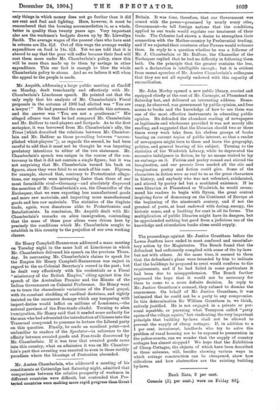Mr. John Morley opened a new public library, erected and
equipped chiefly at the cost of Mr. Carnegie, at Plumstead on Saturday last, and delivered an interesting address. Demo- cracy, he observed, was government by public opinion, and free access to books and the knowledge of how to use them was one of the most effective instruments in educating public, opinion. He defended the abundant reading of newspapers as legitimate and wholesome provided it was not merely idle reading, and suggested that the librarian should two or three times every week take from his shelves groups of books bearing on current topics of public interest, so that a reader of newspapers might turn to them and learn the geography, politics, and general bearing of his subject. Turning to the statistics of the Woolwich Library, while he deprecated the excessive indulgence in fiction, he by no moans wished to lay an embargo on it. Fiction and poetry roused and stirred the imagination, and our prosaic lives needed all the stir and imagination poetry and fiction could give. Some of the characters in fiction were as real to us as the great characters in history, and anybody who was not refreshed, exhilarated, and stirred by poetry led but a mutilated existence. If ho were librarian at Plumstead or Woolwich, he would recom- mend his readers to begin with Byron, the great central inspiring force of democracy on the Continent of Europe at the beginning of the nineteenth century, and if not the greatest of poets, at least endowed with daring, energy, the historic sense, and a loathing for cant in all its forms. The multiplication of public libraries might have its dangers, but he apprehended nothing but good from a judicious use of the knowledge and stimulation books alone could supply.


































 Previous page
Previous page